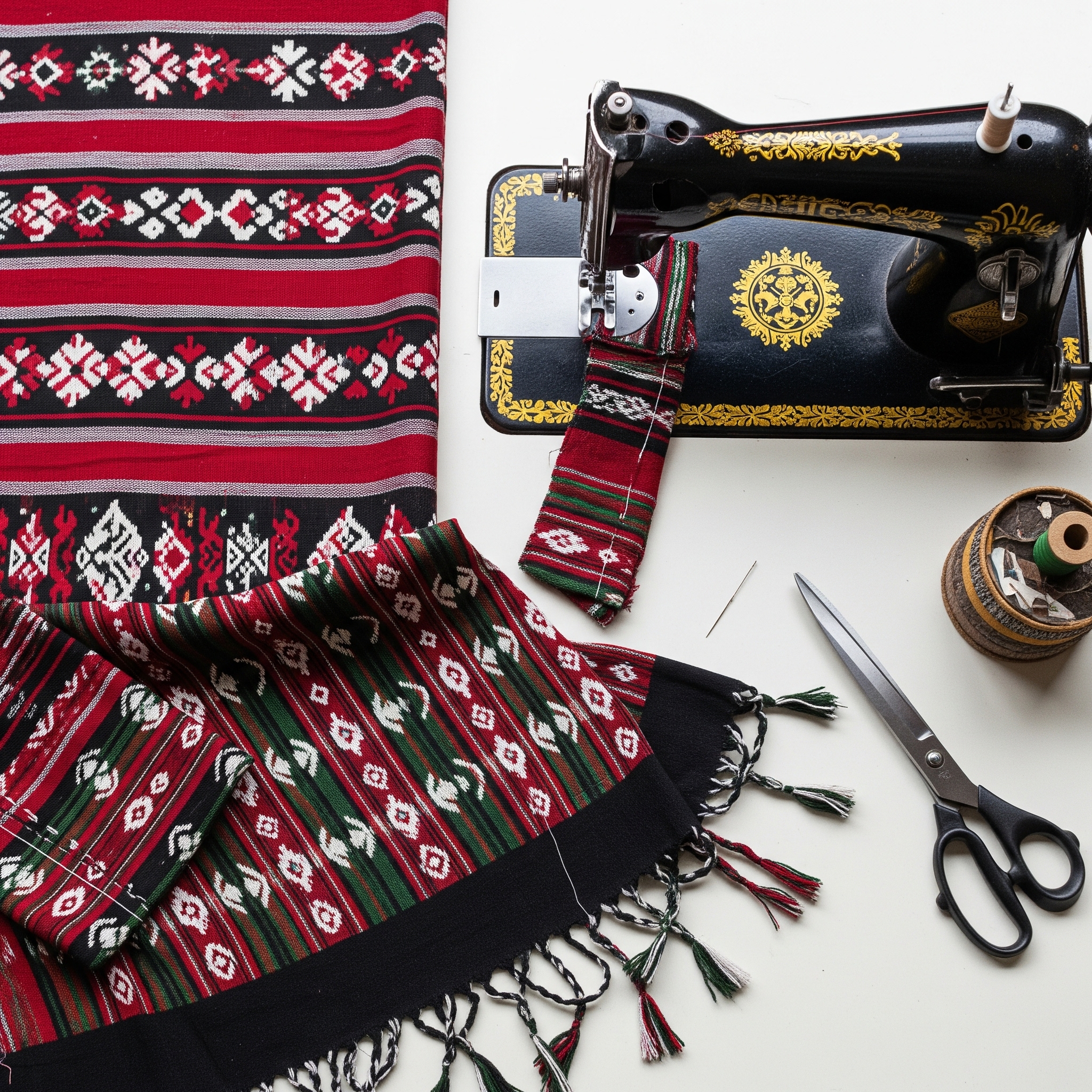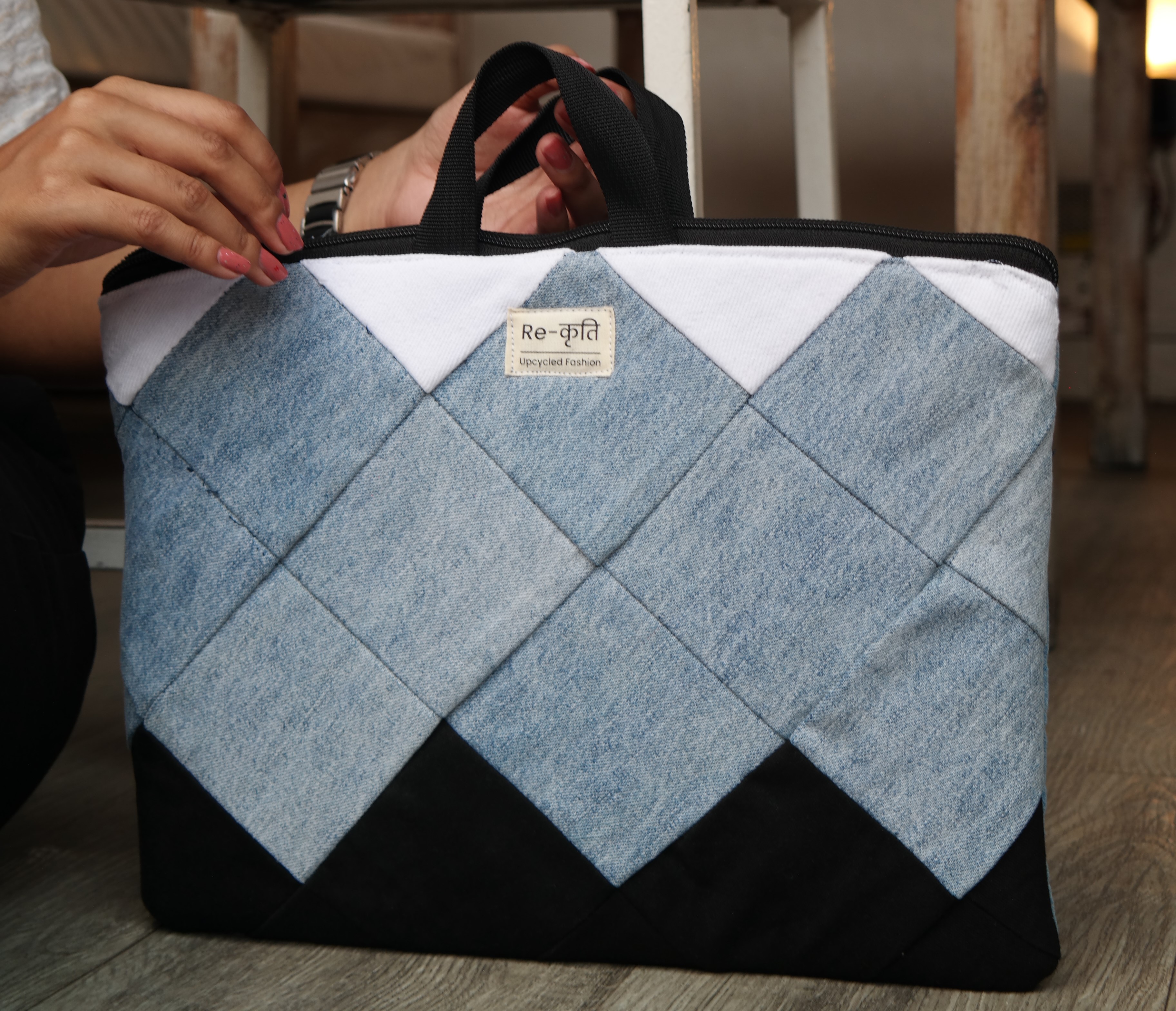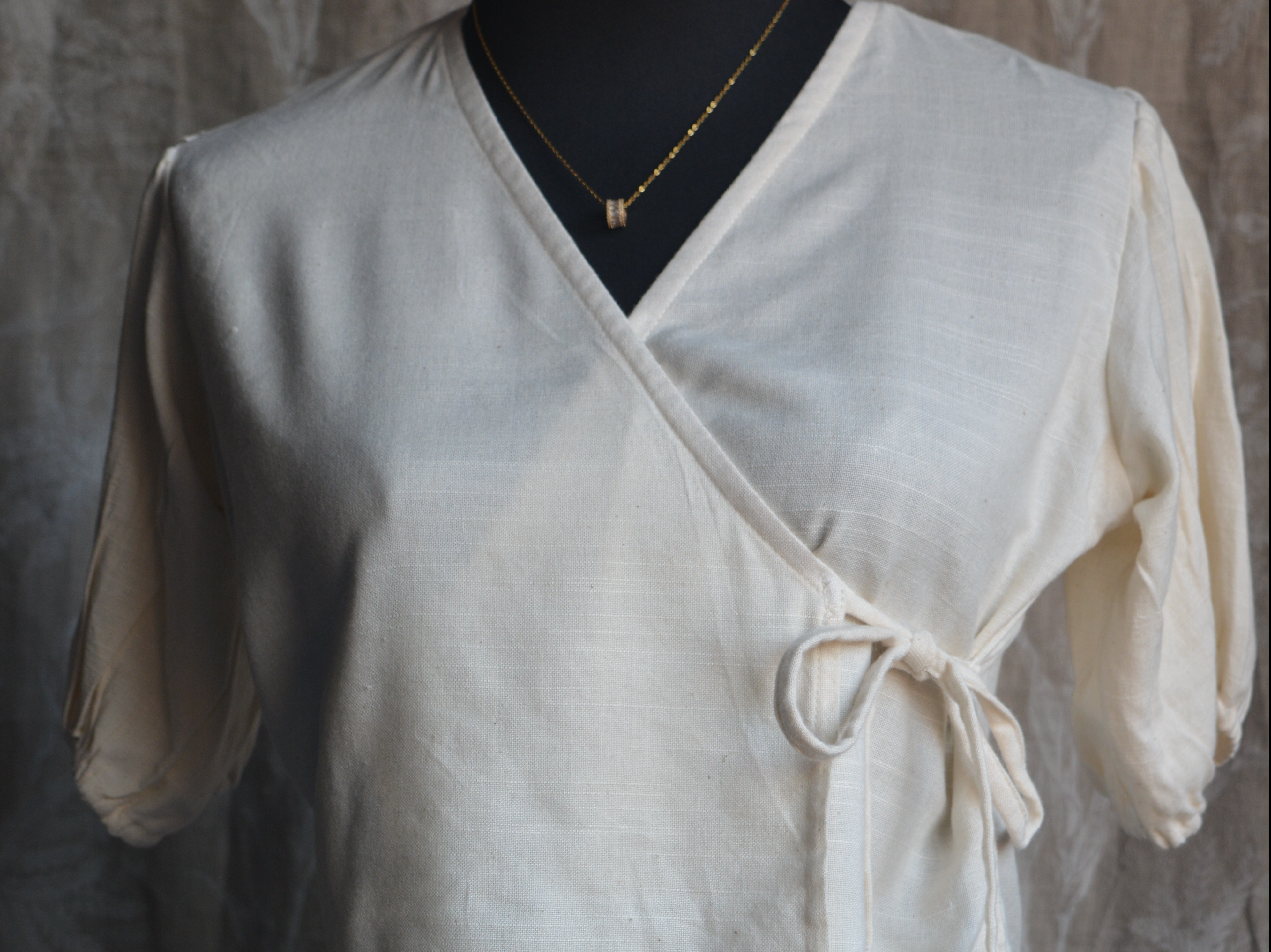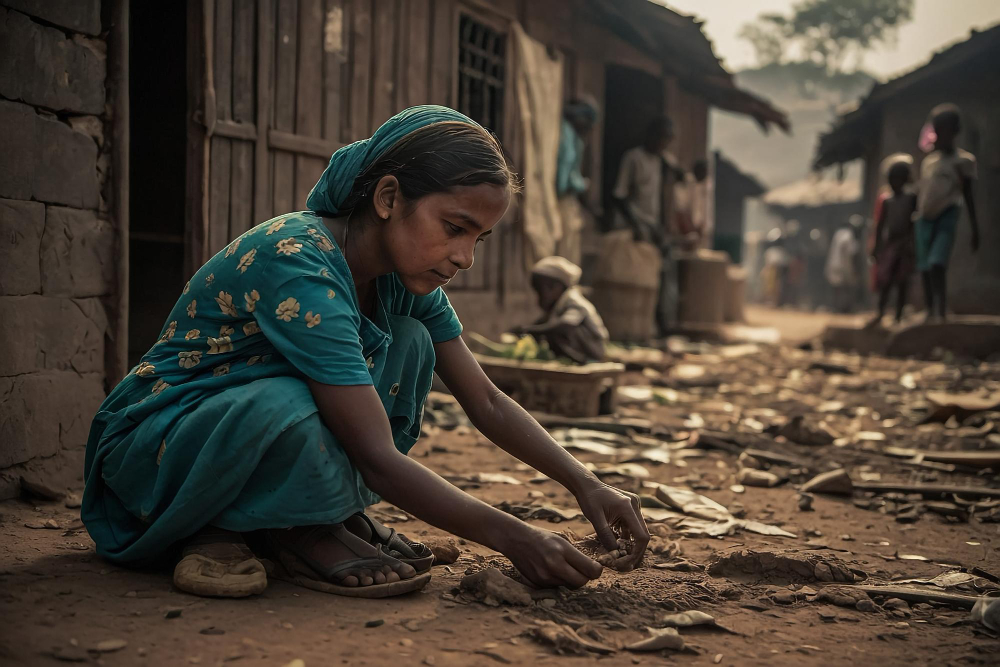Nepali entrepreneurs are redefining fashion with a focus on sustainability, tradition, and ethics, creating eco-conscious brands that empower artisans and protect the planet.

July 25, 2025

Representational AI-generated image showing traditional Nepali Dhaka cloth being prepared for sustainable clothing, with a sewing machine and crafting tools laid out. Credits: Gemini AI
Sustainability is no longer just a trend; it’s a lifestyle, driven by conscious choices and a deep respect for the planet. When fashion meets sustainability, it sparks powerful questions: Can style be ethical? Can an industry built on speed, embrace slowness and intention? In a world racing toward convenience, it takes vision, courage, and resilience to push against the current.
There are several Nepali entrepreneurs who are doing just that–reshaping the fast-paced fashion industry into a sustainable fashion industry with bold ideas rooted in purpose, ethics, and environmental responsibility.
Sustainable fashion builds on the concept of sustainable development, defined by the United Nations in 1987 as “development that meets the needs of the present without compromising the ability of future generations to meet their own needs.”
The term “sustainable fashion” is often used with good intentions. When advocates and experts refer to it along with terms like ethical fashion, green fashion, or eco-fashion, they’re promoting a vision of the fashion industry that respects environmental limits and safeguards the well-being of people and animals across the entire supply chain.
When it comes to Nepal, sustainable fashion is more than just a global movement; it is emerging and spreading its roots in Nepal as a visionary approach to rethink how clothing is made, worn, and valued. At its core, sustainable fashion in Nepal champions environmental consciousness, ethical production, and cultural preservation.
Many local brands are embracing traditional techniques like handloom weaving and natural dyeing, which support artisans while reducing environmental impact. This shift aligns with global efforts to reduce fashion’s footprint, including moving toward a circular economy that minimizes waste and maximizes reuse and recyclability.
In a market long dominated by fast fashion imports, a new wave of Nepali entrepreneurs is proving that fashion can be both beautiful and responsible. Their vision is clear: to create a fashion ecosystem rooted in transparency, fairness, and respect for both people and the planet.
The determination of trailblazers to shift the narrative and take on difficult challenges is exactly what Nepal needs as it becomes part of the global movement toward sustainable fashion—both for everyday wear and across the wider industry.
Nepal’s co-fashion landscape has seen up-and-coming entrepreneurs in the business of uplifting and promoting sustainable fashion.
One such founder is Bini Bajracharya, who is running the ABiR Designer Hub. Bajracharya shares, “My inspiration to run my business comes from the space that I can create employment opportunities in my own country with such a powerful initiative where I can also give back to my community.”
Renu Shrestha, founder of Traditional Alley, emphasizes the evolving and persistent nature of sustainable fashion through the concept of "re-fashion". Shrestha shares, “I try to create and advertise the designs as such clothes that can be worn not only once but more than that, with different styles. The trick lies in how to reverse the fleeting nature of things and create attire and content around that attire that would make the population get HOOKED!”
Re-fashion refers to the transformation of old or discarded clothing into new, stylish pieces through upcycling and redesign. This approach helps reduce waste and lessen fashion’s environmental impact. In Nepal, Traditional Alley embodies this practice, merging traditional craftsmanship with modern, contemporary design—demonstrating that sustainable fashion can be both creative and eco-friendly.
When it comes to the younger generation, awareness about sustainable fashion is not enough! Sustainable fashion brands must also ensure their products are accessible and affordable. Nasana Bajracharya, founder of Re-Kriti, pours her heart when she says, “As students with their given economic constraints, it is next to impossible for sustainable fashion brands to compete with the imported fast fashion retailers. Entrepreneurs need to be aware of this.”

A stylish laptop sleeve from Re-कृति, transforming discarded denim into a statement of sustainable style right here in Nepal. Credits: Re:Kriti
She suggested there is a need to create campaign spaces to not only promote their products but also to create a market space where the young population can actually purchase and use sustainable fashion products! “One such campaign space run by Re-Kriti is - Upcycle Mela, which is proving to be a success with young college-going students.”
Founders of such institutions have personal motivations and inspiration to start and run their sustainable fashion businesses, while others who leaned into the business through their experiences.
One such founder is Nistha Kayastha, who runs the company Didi-Bahini. “I never thought I would become an entrepreneur, but in my previous job, when I saw a crisis where the women artisans got unemployed, it occurred to me that these artisans need a space to continue the wonderful job that they do, and probably I can take that initiative.”
“For me, empowering women was a no-brainer, and if being an entrepreneur is what it takes to do that, then I would gladly take up that space, which can empower women,” she adds.
Nepal’s sustainable fashion movement is fueled by passionate entrepreneurs determined to redefine the industry with purpose and creativity. Founders of Didi-Bahini and ABiR are driven by the desire to create local employment and give back to their communities, while Traditional Alley and Re-Kriti champion re-fashion: upcycling clothes to extend their life through innovative designs.
Together, these trailblazers reflect Nepal’s growing commitment to blending tradition, innovation, and social impact in the pursuit of a more sustainable fashion future.
As Nepal’s sustainable fashion movement continues to grow, the future looks promising with a new generation of eco-entrepreneurs leading the way. These visionaries are not only preserving cultural heritage and traditional craftsmanship but also innovating to make sustainable fashion accessible, affordable, and appealing to a wider audience, especially young consumers.

Didi Bahini Creation’s ethically made top. Credit: Didi Bahini Nepal
This is visible through the efforts of Fashion Revolution, a national team leading the global Fashion Revolution campaign, which champions a fashion industry that is both sustainable and ethical. Their efforts highlight key concerns such as supply chain transparency, fair labor practices for garment workers, and minimizing textile waste.
The movement urges consumers to recognize the impact behind their clothing and question #WhoMadeYourClothes.
Along with initiatives like upcycling campaigns and community-driven businesses that empower artisans and promote ethical production, Nepal is carving out a unique path in the global fashion landscape.
Of course, there are challenges, from competing with fast fashion imports to building scalable markets, but the passion and resilience of these Nepali entrepreneurs offer hope that sustainable fashion will be a core part of the country’s identity and economy.
This vision for the future is echoed in the bold steps taken by influential sustainable fashion advocates like Srichchha Pradhan, Miss Nepal World 2023, through her initiative Deego Pranali. Her statement is clear: it’s time to question what the industry has long accepted and recognize the harm behind it.
Pradhan emphasizes the need to challenge norms to spark real change, and she does just that by championing sustainable fashion in the pageantry world, a space conventionally dominated by fast fashion and glamour.
As she and many others highlight, sustainable fashion isn’t a fleeting trend; it’s a lifestyle rooted in responsibility and awareness. When promoted with intention, this movement holds the power to yield long-term benefits for people, the planet, and future generations.

By sharing valuable information and sparking inspiration, we aim to foster growth, innovation and brighter opportunities for future generations.
Contact us